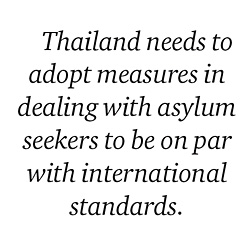
The new, high-profile chief of immigration is promising an optimistic and extremely welcome change of policy. While the exact plans are being thrashed out, Pol Lt Gen Surachate Hakparn pledges to provide more humane and professional treatment of refugees and asylum seekers.
The new immigration chief made the pledge while in a discussion with mostly foreign media last week at the Foreign Correspondents Club of Thailand. It has become obvious the country's actions aren't up to international standards, and it's Thailand that suffers, in addition to the men, women and children involved.
The few reporters who wrote up the meeting generally called it a promise for "more tolerant treatment of refugees". They highlighted Pol Lt Gen Surachate's promise never again to force migrants and asylum seekers to return home involuntarily. He promised his bureau "will now follow international norms", with details soon to be revealed.

The pledge followed two unsavoury asylum cases. An 18-year-old Saudi woman tried to pass through immigration at Suvarnabhumi airport on her way to Australia. But Pol Lt Gen Surachate's Immigration Bureau agents stopped and restrained Rahaf Mohammed al-Qunun for no obvious reason except that the Saudi Arabian embassy requested her detention. The Saudis obviously hoped Thailand would force the teenage runaway back to her country. The UN and a 35,000-strong virtual flash mob intervened on Twitter and she has wound up as a refugee in Canada.
The second contentious case of a Bahraini football player is similar in many ways. Using a false Interpol red notice, Bahrain and the Thai authorities forced the imprisonment of Hakeem al-Araibi. Sentenced in absentia in 2014 to 10 years in prison for allegedly vandalising a police station, the 25-year-old former footballer still might be extradited to Manama, Bahrain, amid concerns that the charges against him are political in nature and quite possibly false. He should have been accepted as a legal tourist in Thailand, or sent back to Australia, where he is a registered refugee.
In another massively under-reported development, the government signed on to a new UN agreement on migration. It is called the Global Compact for Safe, Orderly and Regular Migration. Inking the agreement, which is not legally binding, shows the country's good will in dealing with one of the most challenging issues of the 21st century. According to statistics released by the International Labour Organisation in May, 2018, the country is home to 3.2 million documented migrants.
Thailand's UN delegation not only committed the country to adhere to the pact when it passed on Dec 19 by a vote of 152-5 with 36 abstentions. It promised to implement it, and "strengthen regional and national mechanisms". It is a remarkable change to Thai policy. It should be noted that the country is one of a tiny handful that never ratified international agreements on refugees that almost every nation in the world follows.
Thailand needs to adopt measures in dealing with asylum seekers to be on par with international standards.
What the country is doing regarding the al-Araibi case is certainly not in sync with the civilised world.
